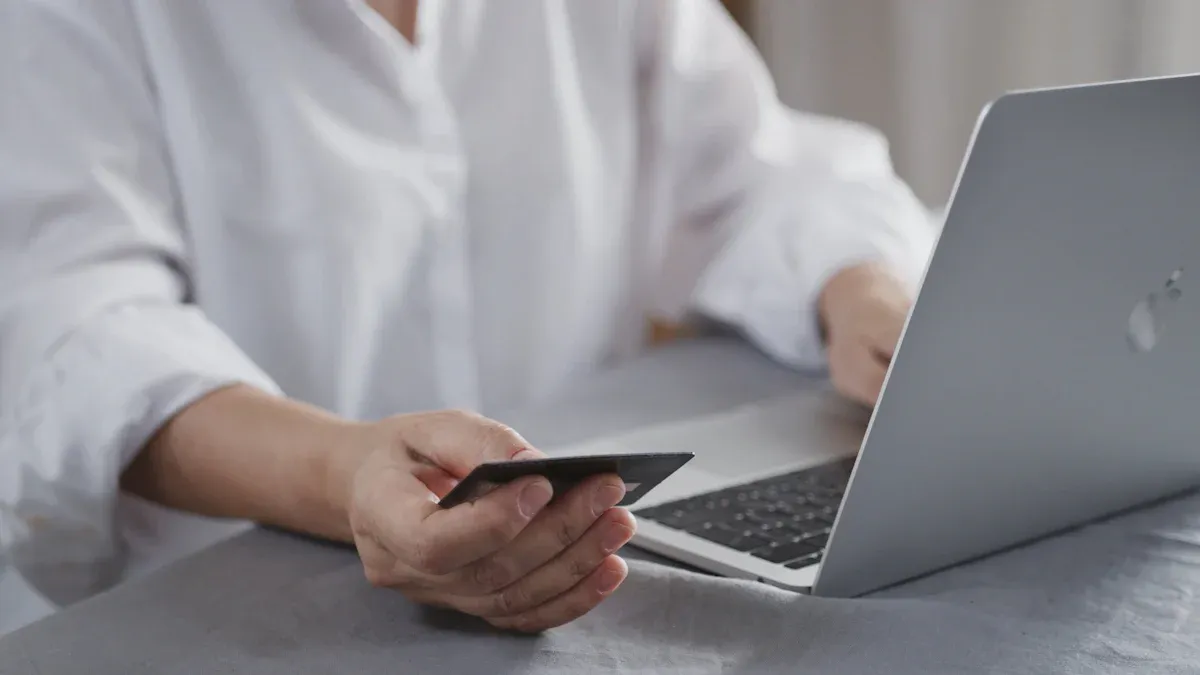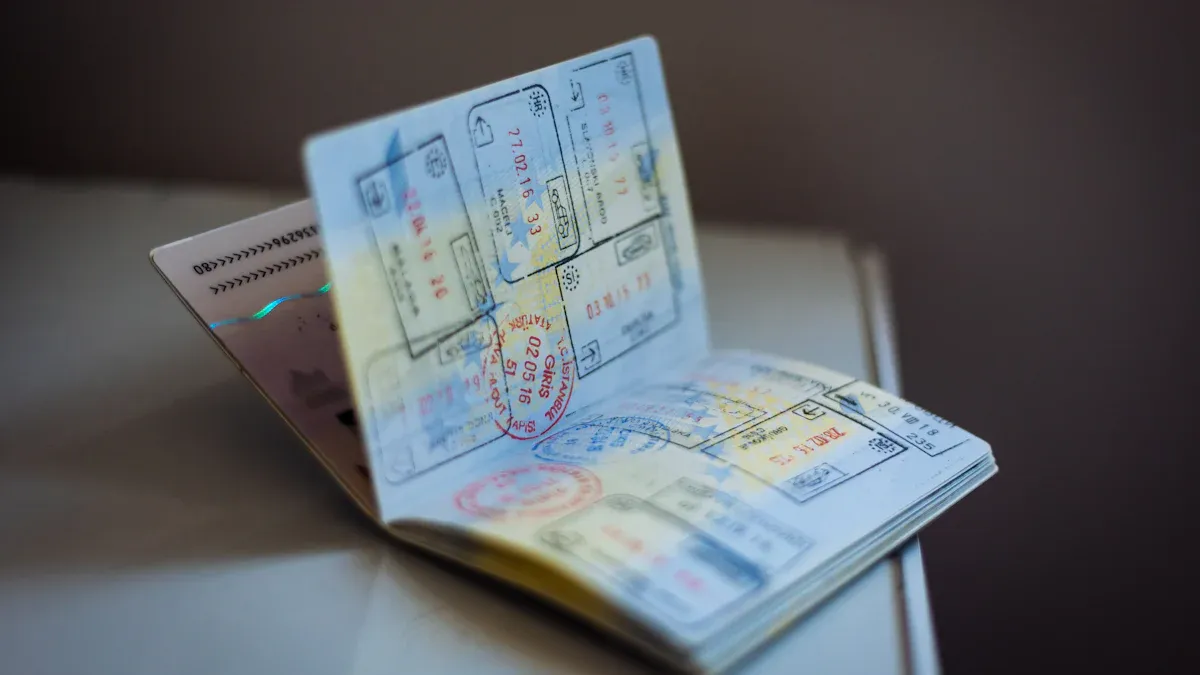- EasyCard
- Trade
- Help
- Announcement
- Academy
- SWIFT Code
- Iban Number
- Referral
- Customer Service
- Blog
- Creator
Simple steps for Americans to open a bank account in Switzerland

Image Source: unsplash
You can open a bank account in Switzerland, including a Swiss bank account, even as an American. Many people choose to open a bank account in Switzerland to protect their assets from market fluctuations or political risks. Swiss banks are known for their strong privacy, stability, and expert investment advice. The process to open a bank account in Switzerland involves specific steps and required documents. Due to Swiss law and U.S. tax regulations, strict compliance is necessary, so you must follow each step carefully. Swiss banks attract Americans who want to open a bank account to diversify their assets and enjoy the security of Switzerland’s stable environment.
Key Takeaways
- Americans can open Swiss bank accounts but must meet strict rules and provide many documents, including proof of identity and source of funds.
- Only a few Swiss banks accept U.S. clients due to extra tax laws, so choose banks experienced with American customers.
- You can apply online or in person, but be ready for background checks, paperwork, and possible high minimum deposits.
- Swiss banks report your account details to the IRS, so you must follow U.S. tax rules and file required forms to avoid penalties.
- Opening and maintaining a Swiss bank account involves fees and ongoing compliance, but careful planning helps you enjoy Swiss banking benefits.
Can Americans Open a Swiss Bank Account?
Legal Requirements
You can open a swiss bank account in Switzerland, but you need to meet strict requirements. Swiss banks want to know who you are and where your money comes from. Here is what you need for the application process:
- Show a valid passport and certified copies for proof of identity.
- Prove the legal source of your funds. You can use salary slips, tax returns, or professional certificates.
- Give proof of address and other personal details.
- Be at least 18 years old.
- Have a clean criminal record and good financial standing.
- Go through strict background checks because of Anti-Money Laundering (AML) and Know Your Customer (KYC) laws.
- As a U.S. citizen, you face extra checks due to the Foreign Account Tax Compliance Act (FATCA). Swiss banks must report your account details to the IRS.
- Expect more paperwork and disclosure steps during the application.
- Some banks may not accept your application because of these rules.
- You usually need a minimum deposit, often around USD 250,000, to open a swiss bank account.
- You can complete the application process in person or remotely, but in-person visits often go smoother.
- Opening fees can range from USD 1,000 to 3,000 or more.
Swiss banks in major cities are more likely to accept non-resident clients. The bank account opening process for nonresidents of switzerland is detailed and can take time.
Restrictions for U.S. Citizens
Swiss banks place extra restrictions on U.S. citizens. Here are some common issues you might face:
- Many swiss banks refuse to open swiss bank accounts for U.S. citizens because of FATCA reporting rules.
- Only a few banks in switzerland accept U.S. clients. These banks must have a U.S. license and follow strict compliance.
- You must provide a U.S. tax identification number, proof of address, and proof of funds for your application.
- Some banks require you to visit in person for identity checks.
- Minimum balance requirements are common and can be high.
- Swiss banks share account details with tax authorities, including the IRS, so privacy is limited.
- You must follow U.S. tax rules, like filing FBAR and Form 8938, or face penalties.
Swiss banks often reject American applicants because the application process is complex and costly. The business bank account in switzerland process is even stricter. If you want to open a swiss bank account, choose a bank with experience in banking in switzerland for U.S. clients. This will help you meet all requirements and complete the bank account opening process smoothly.
How to Open a Swiss Bank Account

Image Source: pexels
Opening a swiss bank account in switzerland can feel like a big task, but you can break it down into simple steps. Here’s how to open a swiss bank account as an American, from choosing the right bank to making your first deposit.
Choose a Bank
You need to start by picking a swiss bank that fits your needs. Not every bank in switzerland accepts American clients, so you should look for banks with experience serving U.S. citizens. Some well-known options include UBS, Julius Baer, and Pictet. These banks offer different types of swiss bank accounts, such as personal, business, and trust accounts. If you want to open a business bank account in switzerland, you will need extra paperwork and official documentation.
Tip: Check if the bank allows non-resident clients and supports online account opening. Some banks in switzerland have U.S. offices or work with American expats, making the application process easier.
Open Bank Account Online or In Person
You can open a bank account in switzerland either online or by visiting a branch in person. Many swiss banks now offer online account opening, but some still require you to come to switzerland for identity checks. If you already have a relationship with the bank or meet certain requirements, you might complete the application remotely. Online account opening usually involves video calls or digital verification.
- Online: Start by filling out the application on the bank’s website. Upload your documentation and wait for the bank to review your details.
- In Person: Schedule a meeting at a swiss bank branch. Bring all your paperwork and be ready for an interview about your finances and the source of your funds.
Required Documents
Swiss banks have strict documentation requirements. You must gather documentation before starting the application process. Here’s a table showing what you need:
| Document Type | Description / Examples |
|---|---|
| Valid government-issued ID | U.S. passport or driver’s license |
| Proof of address | Utility bill, lease agreement, or official documentation |
| Proof of the source of your funds | Pay stubs, tax returns, business income statements |
| Completed application forms | Bank-specific paperwork |
| Tax Identification Number (TIN) | Needed for U.S. tax compliance |
| Background checks | Swiss banks check your history for KYC and AML rules |
You may also need to demonstrate the source of their wealth, especially if you plan to open a swiss bank account with a large deposit. Some banks ask for extra documentation, like proof of profession or identification of beneficiaries.
Application and Verification
After you submit your application, the swiss bank will start the verification process. This step is important for banking in switzerland. The bank checks your identity, reviews your paperwork, and makes sure you meet all requirements for opening a swiss bank account. Here’s what usually happens:
- The bank reviews your application and documentation.
- You may need to join a video call or visit the branch for identity verification.
- The bank checks your background and asks about your financial activities.
- You answer questions about your source of funds and why you want to open a swiss bank account.
- The bank completes compliance checks, including KYC and AML rules.
- If everything is correct, the bank approves your application.
Note: The application process can take a few days to several weeks. Swiss banks want to make sure you follow all rules in switzerland and the U.S.
Initial Deposit
Once your application is approved, you need to make your first deposit. The amount depends on the type of swiss bank account and the bank’s requirements. For non-resident clients, the minimum deposit often ranges from USD 10,000 to USD 250,000 for retail banking, and can go up to USD 500,000 or more for private banking. Some swiss banks require even higher deposits for exclusive services.
- You can transfer funds from your U.S. account to your new swiss bank account.
- The bank may ask for official documentation to confirm the source of your deposit.
- After you make your first deposit, your account becomes active, and you can start banking in switzerland.
Remember: The bank account opening process includes fees, paperwork, and ongoing compliance. You must keep your documentation updated and follow all swiss and U.S. tax rules.
Opening a swiss bank account in switzerland takes time and careful planning. If you follow each step, gather documentation, and meet the requirements for opening a swiss bank account, you can enjoy the benefits of swiss banking. Whether you choose online account opening or visit in person, the process is clear if you stay organized.
Costs and Fees for Swiss Bank Accounts

Image Source: unsplash
Account Opening Fees
When you start the bank account opening process in Switzerland, you will notice that swiss banks often charge a fee just to set up your account. These fees can range from $1,000 to $3,000 USD or more, depending on the bank and the type of account you choose. Some banks may offer lower fees for basic accounts, but private banks usually charge higher fees because they provide extra services. You should always ask about these costs before you begin, so you know what to expect.
Maintenance and Transaction Fees
Swiss banks are famous for their high-quality service, but this comes with ongoing costs. You will likely pay monthly or yearly maintenance fees to keep your account active. These fees can be higher if you use wealth-management services or need special support. You might also pay extra for international transfers, currency exchanges, or even for accessing your money from outside Switzerland. Sometimes, you may need to visit Switzerland in person, which adds travel expenses. These ongoing costs can add up quickly, especially if you use your account for many transactions.
Note: Many Americans who open swiss bank accounts keep large balances, often around $1.5 million USD per account, based on financial data from swiss banks. This helps cover the higher fees and makes it easier to meet the bank’s requirements.
Minimum Deposit
Swiss banks have strict minimum deposit rules, especially for Americans. Here is what you can expect:
- Some swiss banks let you open an account with as little as $10,000 USD.
- Because of extra rules for U.S. citizens, most banks in Switzerland require a minimum deposit between $250,000 and $500,000 USD.
- Private banks often ask for at least $500,000 USD, and sometimes you need an invitation or a referral.
- Retail banks may have lower minimums, but they do not offer the same level of service as private banks.
| Bank Type | Typical Minimum Deposit (USD) |
|---|---|
| Retail Bank | $10,000 – $250,000 |
| Private Bank | $500,000+ |
If you plan to open a swiss bank account in Switzerland, make sure you can meet the minimum deposit. This is one of the most important steps in the bank account opening process.
Key Considerations for Americans
FATCA and U.S. Tax Compliance
If you want to open a swiss bank account in switzerland, you need to understand FATCA. This law makes swiss banks report your account details to the IRS. Because of FATCA, many swiss banks hesitate to work with Americans. You will face extra paperwork, like FATCA declarations and providing your Social Security Number. Some banks may even freeze your account or deny your application if you are a U.S. citizen.
You must also follow strict IRS rules. If your total foreign accounts go over $10,000 at any time in the year, you must file an FBAR (FinCEN Form 114). If your foreign assets are above $200,000 at the end of the year, you may need to file Form 8938. The IRS can give big fines for missing these forms—up to $10,000 for non-willful mistakes and up to $100,000 or 50% of your account for willful violations. Even as an expat or non-resident, you must report your swiss bank account if you meet these limits.
| Requirement | Details |
|---|---|
| FBAR Filing | File if accounts exceed $10,000 at any time during the year |
| Form 8938 | File if assets exceed $200,000 at year-end |
| Penalties | Up to $10,000 (non-willful), $100,000 or 50% of account (willful) |
| Recordkeeping | Keep records for 5 years |
Privacy and Data Sharing
Banking in switzerland is famous for privacy, but things have changed. Swiss banks now share your account data with U.S. tax authorities because of FATCA. Switzerland agreed to send this information directly to the IRS. Swiss privacy laws still protect your data, but they allow sharing when you are a U.S. account holder. The Swiss-US Data Privacy Framework helps make sure your information is handled safely. Even with banking secrecy, you should expect less privacy if you are an American with a swiss bank account.
Bank Options for U.S. Clients
Not every swiss bank in switzerland will accept you as a client. Only a few banks work with Americans, and they often have U.S. licenses or offices. Some examples include UBS Swiss Financial Advisers, Vontobel Swiss Wealth Advisors, and Pictet North America Advisors. These banks offer services for U.S. clients, like IRS-compliant tax reporting and regular updates. You will need to provide documents such as your U.S. passport, IRS forms, and proof of income. Most of these banks require high minimum investments, sometimes $750,000 or more. If you are a non-resident or one of the nonresidents of switzerland, you may find it even harder to open an account. Always check the requirements before you start banking in switzerland.
You can open a bank account in Switzerland if you follow the right steps. Start by gathering your documents, like your passport and proof of funds. Pick a Swiss bank that works with Americans and complete the application. Always check legal and tax rules in both Switzerland and the U.S. For extra help, consider these resources:
- Work with financial advisors or legal teams to prepare paperwork.
- Use advisory services, such as Dominion, for guidance on Swiss bank account options.
Tip: Stay organized and review your account often to keep up with compliance.
FAQ
Can you open a Swiss bank account without visiting Switzerland?
Yes, you can open an account remotely. Some Swiss banks let you apply online or by mail. You may need a video call for identity checks. Check with the bank first to see if they offer this option.
What happens if you do not report your Swiss bank account to the IRS?
If you do not report your account, you risk heavy fines. The IRS can charge up to $10,000 for simple mistakes. Willful violations can lead to even bigger penalties or legal trouble.
Do Swiss banks offer accounts in U.S. dollars?
Yes, many Swiss banks let you hold accounts in U.S. dollars. You can also choose other major currencies. This helps you manage your money across different countries.
How long does it take to open a Swiss bank account?
The process usually takes from a few days to several weeks. The time depends on the bank, your documents, and how quickly you respond to requests. Private banks may take longer because of extra checks.
While Swiss bank accounts are known for stability, for Americans they often mean strict compliance, high fees, and steep deposit requirements. If your goal is to manage money internationally with ease, BiyaPay offers a smarter alternative. With transparent real-time exchange rates and remittance fees as low as 0.5%, you can transfer funds seamlessly. BiyaPay supports multiple fiat and digital currency conversions, covers most countries and regions worldwide, and enables same-day transfers for unmatched speed.
Skip the high barriers of Swiss banking—start today with BiyaPay and experience secure, global, and cost-effective cross-border payments.
*This article is provided for general information purposes and does not constitute legal, tax or other professional advice from BiyaPay or its subsidiaries and its affiliates, and it is not intended as a substitute for obtaining advice from a financial advisor or any other professional.
We make no representations, warranties or warranties, express or implied, as to the accuracy, completeness or timeliness of the contents of this publication.




Contact Us
Company and Team
BiyaPay Products
Customer Services
is a broker-dealer registered with the U.S. Securities and Exchange Commission (SEC) (No.: 802-127417), member of the Financial Industry Regulatory Authority (FINRA) (CRD: 325027), member of the Securities Investor Protection Corporation (SIPC), and regulated by FINRA and SEC.
registered with the US Financial Crimes Enforcement Network (FinCEN), as a Money Services Business (MSB), registration number: 31000218637349, and regulated by FinCEN.
registered as Financial Service Provider (FSP number: FSP1007221) in New Zealand, and is a member of the Financial Dispute Resolution Scheme, a New Zealand independent dispute resolution service provider.




















